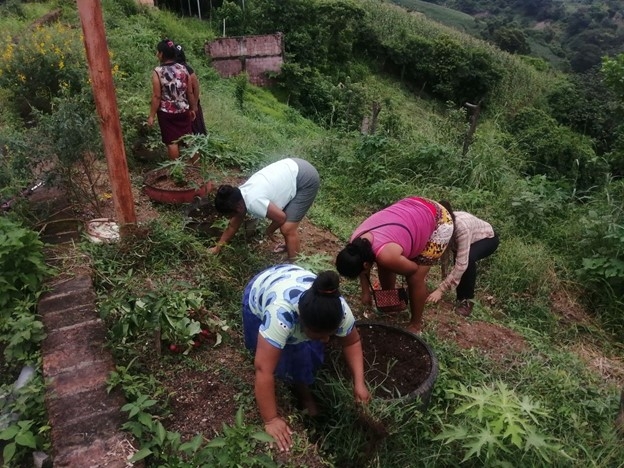Women growing food organically
Problem & Solution
In the community of El Gavilán in the department of Ahuachapán, municipality of Tacuba, women found themselves without participation in agriculture and without access to land.
The solution was to give women training in the production of organic food and in garden care, for example by working the soil with ashes, dry leaves, microorganisms, rice husks and chicken manure when planting. Each day of the training was a space to exchange ideas and look for solutions to the various personal problems that each of the women had. Together, the burden is much lighter.

the experience
A group of organised women, aged between 20 and 50, with different marital status, have received training from various organisations working in the area, FUNDESYRAM and Ayuda en Acción, among them. They decided to put what they have learnt into practice.
In order to get their project off the ground, a 450 square metre plot of common land was rented to cultivate a vegetable garden. In 2019, five women started the project, now 20 women are trained in organic agriculture and have a voice in their community.
They have organised themselves into groups and have expanded the garden, where they grow various plants, such as aubergines, lettuce, tomatoes, cucumbers, chilli peppers, radishes, baby squash and aromatic herbs. The harvest is always shared among all of them. The women also arranged water for irrigation, as the land does not have access to water.
Challenges
- Food insecurity and malnutrition
- Lack of water to irrigate plants
- Lack of access to land for women
- Lack of women's participation in the community
Impact
- Improved the health and nutrition of their families, especially children
- Good agricultural production practices that help adapt to climate change were replicated
- Women established spaces for participation in their community
- Women are aware of and enforce their rights
Lessons Learned
- Plan crop management considering the climate of the area
- Foster community values in the participants
- The whole group should take ownership of the project
- Leave days of socialising, not just work

